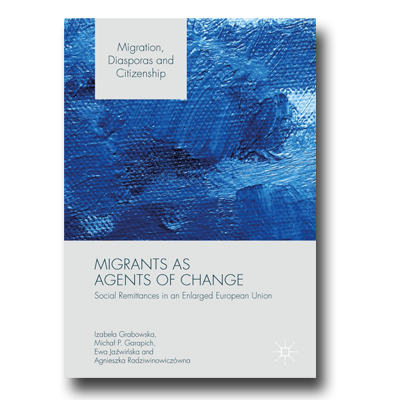For the past few years, the topic of migration has been appearing in media daily. Recent Brexit has added a new dimension to the discussion and has posed new challenges for the European Union. A new book, Migrants as Agents of Change, by Izabela Grabowska, et al., addresses some of the aspects of migration within the EU.
Social Remittances
So far, much attention has been given in migration literature to the role of economic remittances. However, it is sometimes overlooked that money is not the only “asset” to be remitted between countries, but that migrants also transmit social remittances, i.e. knowledge, skills, codes of behavior, norms and values, practices and social capital.
Therefore, the authors focus on the social and cultural outcomes of the major EU enlargement of 2004. In particular they concentrate on the Polish-British case given the spectacular increase in labor mobility between the two countries since Poland joined the EU.
As some people settled in the receiving locations of the EU, others engaged in forms of circular labor migration or returned to the sending countries. A complex process of generating social remittances and cultural diffusion between “new” and “old” EU Member States emerged and grew over the years.
The book traces in detail what happens when migrants are exposed to new settings, how they make sense of this logic of novelty and unfamiliarity, what they identify as beneficial and potentially valuable or not, once they start becoming familiar with the details of the British social life.
Impact of migration on home and destination communities
Researchers show that local inhabitants see migration as a general social phenomenon and not as new patterns, with examples set by other people to be eventually followed and adopted. The impacts of migration are perceived in a biased way. On the one hand, migration is seen to modernize local towns (e.g. by creating new workplaces and improving the quality of life). On the other hand, it is seen as adverse to local communities (e.g. by breaking down family life).
Likewise, the general attitudes to the ideas and behavior brought from abroad are rather ambivalent among local inhabitants. The range of local spillovers of social remittances depends on a “socially useful role” in a community and on having a range of contacts with different categories of local residents. At the same time, social remittances are often resisted by local inhabitants, more on the basis of the general conservatism of local communities than on the content of these cultural and social transfers.
The researchers present evidence that migrants, under certain conditions, may act as local agents of change by transferring social remittances. Firstly, migrants need to act actively and daily in given opportunity structures, in both communities of origin and destination. Secondly, they need to enjoy some degree of local social recognition (which does not necessarily translate into a high social status in the community in general) in order to disseminate forms of social change to such ideas and practices. Thirdly, they need to have an extensive network of contacts to be successful in transmitting social remittances.
 Book published in the series Migration, Diasporas and Citizenship by Palgrave Mcmillan.
Book published in the series Migration, Diasporas and Citizenship by Palgrave Mcmillan.
Recommendations
"An important contribution to debates about migration and social change. Based on interdisciplinary, longitudinal research on migration between three Polish communities and the United Kingdom in post-accession Europe, Grabowska and her colleagues carefully unpack how social remittance transfers actually work. In a world in which sending governments look increasingly to emigrants’ economic and social contributions, this book is an invaluable guide to how and when innovation, or resistance to it, occur."
Peggy Levitt, Harvard University
„This thought-provoking and original book looks at individuals who return to their places of origin from living abroad. It examines why some are able to make a difference to local opinions and behaviour, while many others do not. Based on extensive longitudinal ethnographic and sociological research in Poland and the UK, the book makes a ground-breaking contribution to the literature on social remittances and migrant agency. That contribution is not just rich in empirical detail, but also theoretical and methodological. Thanks to the authors, the concept of social remittances is now a much more precise tool for analysing the impact of migration on sending countries."
Anne White, University College London
About the Author
Associate Professor Izabela Grabowska, Ph.D. – a sociologist and economist, specializing in research on employment market, the school-to-work transition as well as development and migration with a focus on skill transfer. Her research interests also include career development of globally mobile individuals, and social remittances.
International Research Coordinator at the Centre of Migration Research, at the University of Warsaw. Deputy Chair of the Board of Directors and a member of the Executive Board at IMISCOE Research Network (International Migration, Integration and Social Cohesion). She collaborates with Ernst & Young Business School in Bologna, consulting on Public Employment Services, such as EURES, the European job mobility portal. She advises District Employment Offices in Poland on the assessment of employment practices and the design of career paths for the unemployed. A national expert at the European Commission for the new European Qualifications Framework (EQF) with respect to the European Skills, Competences, Qualifications and Occupations (ESCO).
At SWPS University, she teaches at the Faculty of Arts and Social Sciences. She also is Head of the Interdisciplinary Doctoral Program and Head of Youth Research LAB.